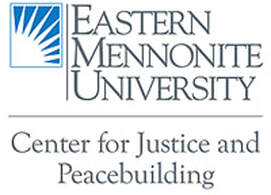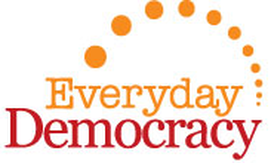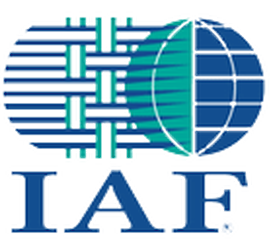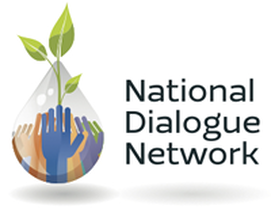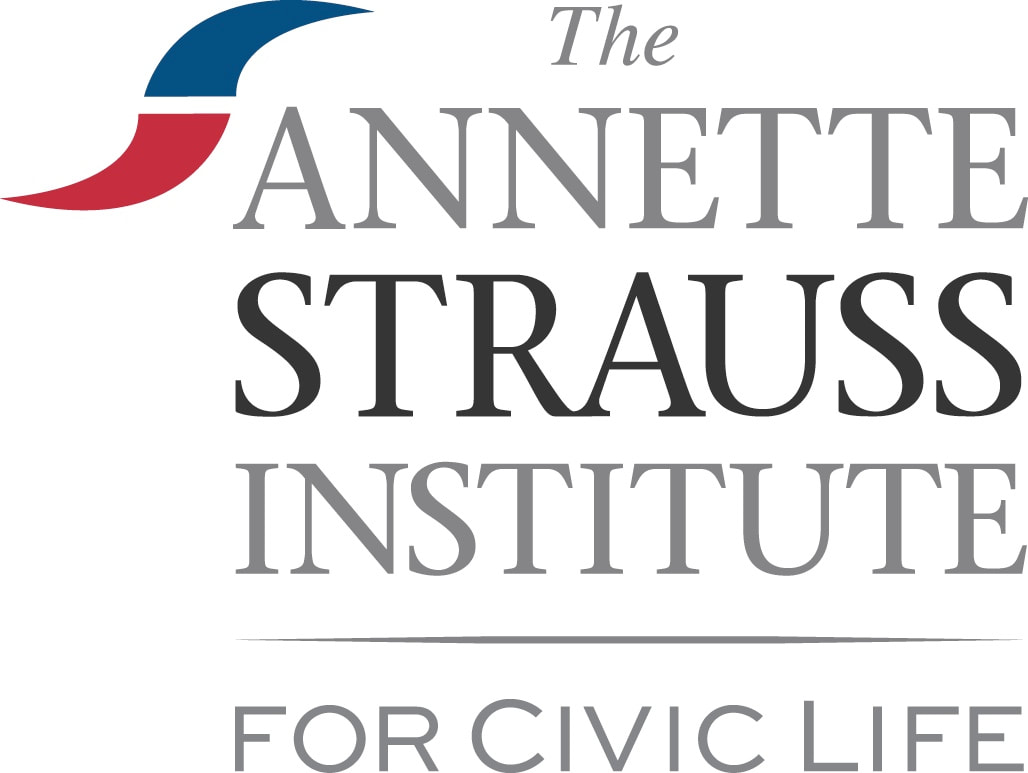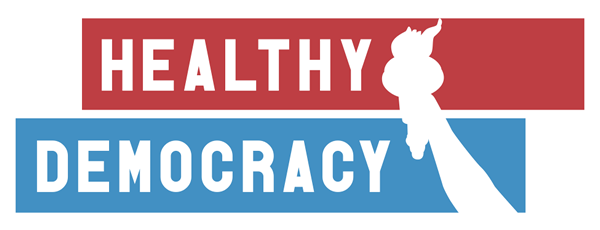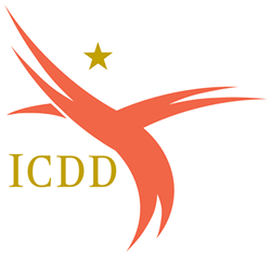Leading organizations in the dialogue and deliberation community generously supported the 2014 National Conference on Dialogue & Deliberation.
NCDD sends its heartfelt thanks to the organizations on this page for their fantastic support of NCDD 2014. We couldn’t do it without you!
Our All-Star Sponsors (donated $3000+) were the Democracy Fund, the Interactivity Foundation, the Public Conversations Project, and Penn State’s McCourtney Institute for Democracy and Center for Democratic Deliberation.
Our Co-Sponsors ($2000) were Alynd, the Center for Justice & Peacebuilding at Eastern Mennonite University, Everyday Democracy, the International Association of Facilitators, and the National Dialogue Network.
And our Partners ($1000) were the Annette Strauss Institute for Civic Life, the Close Up Foundation, Healthy Democracy, the Institute for Civic Discourse and Democracy, the Institute for Local Government, the League of Extraordinary Trainers, Mid-Atlantic Facilitators Network, PlaceSpeak, Public Agenda, and the William D. Ruckelshaus Center.
NCDD sends its heartfelt thanks to the organizations on this page for their fantastic support of NCDD 2014. We couldn’t do it without you!
Our All-Star Sponsors (donated $3000+) were the Democracy Fund, the Interactivity Foundation, the Public Conversations Project, and Penn State’s McCourtney Institute for Democracy and Center for Democratic Deliberation.
Our Co-Sponsors ($2000) were Alynd, the Center for Justice & Peacebuilding at Eastern Mennonite University, Everyday Democracy, the International Association of Facilitators, and the National Dialogue Network.
And our Partners ($1000) were the Annette Strauss Institute for Civic Life, the Close Up Foundation, Healthy Democracy, the Institute for Civic Discourse and Democracy, the Institute for Local Government, the League of Extraordinary Trainers, Mid-Atlantic Facilitators Network, PlaceSpeak, Public Agenda, and the William D. Ruckelshaus Center.
ALL-STAR SPONSORS
The McCourtney Institute for Democracy
|
Pennsylvania State University’s McCourtney Institute for Democracy promotes rigorous scholarship and practical innovations to advance the democratic process in the United States and abroad. The institute pursues this mission in partnership with the Center for Democratic Deliberation and the Center for American Political Responsiveness. The institute and research centers examine the interplay of deliberative, electoral, and institutional dynamics. The main activities of the institute include awarding the annual Brown Democracy Medal for democratic innovation, bringing speakers to campus, sponsoring faculty roundtables and workshops, and financially supporting student research. Prospective undergraduate students should consider attending Pennsylvania State University if they want to focus some or all of their studies on democracy. Students interested in pursuing a PhD in democracy, deliberation, and American government are encouraged to apply to one of the many departments affiliated with the institute and research centers.
Website • Facebook • Twitter • Email |
The Democracy Fund
|
The Democracy Fund invests in organizations working to ensure that our political system is responsive to the public and able to meet the greatest challenges facing our nation. Incubated within the Omidyar Network beginning in 2011, the Democracy Fund is now an independent private foundation within The Omidyar Group. Joe Goldman, former Vice President of Citizen Engagement at AmericaSpeaks, is President of the Democracy Fund. The Fund is a unique philanthropic enterprise driven by Pierre Omidyar’s vision to address the perilous state of our democracy and rebuild public confidence in our political institutions. From 2011 to 2014, the Fund has committed nearly $20 million to support organizations working to strengthen our media, improve the administration of our election and campaign finance systems, and foster more effective governance in the United States.
Website • Facebook • Twitter |
The Interactivity Foundation
|
The Interactivity Foundation works through a facilitated small-group discussion process to increase both the quality and quantity of our public discussions by engaging citizens in the exploration and development of contrasting possibilities, or broad directions, for longer-term public policy. Our work is primarily focused on three types of group discussion. First, longer-term “Project” discussions with selected panelists help to develop the contrasting possibilities for our discussion guides. Second, shorter-term “Public” discussion series use those discussion guides as starting points for further discussion, exploration, and development. And, third, we work with educators in classroom, online, and other educational settings to support student-centered discussion. We are a non-profit, non-partisan, non-advocacy organization. For more information or to download copies of any of our discussion guides or other publications, please visit our website.
Website • Twitter • Facebook • Email |
The Public Conversations Project
|
Since 1989, the Public Conversation Project has worked in the U.S. and around the world facilitating dialogues on a wide range of contentious issues including abortion, forest management, homosexuality and faith, biodiversity, the use of animals in research, the Israeli-Palestinian conflict, and many others. In a world bristling with tension, controversy, polarization, and war, PCP aims to reduce rancor in public squares and promote effective communication within organizations and communities. It also provides workshops and customized trainings that teach people how to use its dialogue methods.
Website • Facebook • Twitter • Email |
CO-SPONSORS
Center for Justice & Peacebuilding at Eastern Mennonite University
|
The Center for Justice and Peacebuilding at Eastern Mennonite University offers graduate-level courses and trainings in international development, strategic peacebuilding, trauma, organizational health and restorative justice, for civil society leaders and professionals looking to develop secondary skills to further their work and organizational mission. CJP’s programs offer formal and informal space for organizing and networking with peacebuilders from around the world: The graduate program has nearly 500 alumni from 60 countries and the Summer Peacebuilding Institute welcomes participants from 40 countries each year. CJP’s faculty are practicing peacebuilders with extensive domestic and international experience, who incorporate that experience in the classroom, offering real-life peacebuilding examples, teachings skills and translating practice into theory. CJP includes the graduate program in conflict transformation; the Summer Peacebuilding Institute; and the Strategies for Trauma Awareness and Resilience program. It was founded in 1994 as a practice-oriented institute that would equip individuals, organizations and communities to work for justice and peace.
Website • Facebook • Twitter • Email |
Everyday Democracy
|
Everyday Democracy works locally and nationally for a stronger and more equitable democracy. In neighborhoods, towns and cities, and regions across the country, we coach people in bringing their communities together in equitable and inclusive dialogue to make progress on some of today’s toughest public issues. From community-police relations, to racism, to education reform and more, Everyday Democracy provides discussion guides, how-to materials and advice to those who want to take on such issues and create sustained change. We also work with issue-based organizations as well as organizations in the democracy and social justice fields to advance a vision and infrastructure for national civic participation. As we mark our 25th anniversary this year, we’re honored to count more than 600 communities and several state and national organizations—including NCDD, of which we’re a founding member— as our partners in strengthening democracy.
Website • Facebook • Twitter • Email |
International Association of Facilitators
|
The International Association of Facilitators is a professional association that sets internationally accepted industry standards, provides accreditation, supports a community of practice, advocates and educates on the power of facilitation and embraces the diversity of facilitators and methods of facilitation around the world. The IAF’s vision is to see professional facilitation used throughout the world to address the challenges faced by people in their groups, organizations and communities. For the last 20 years the IAF has certified Professional facilitators world-wide and now has active members and chapters on every continent and in over 50 countries.
Website • Facebook • Twitter • YouTube |
The National Dialogue Network
|
The National Dialogue Network is a nonpartisan, voluntary working group of practitioners, educators, and researchers building a voluntary civic infrastructure that connects conversations across the U.S. who seek to coordinate collaborative local conversations into mindful national dialogue. Its design and function is meant to strengthen local civic infrastructures that, collectively, can reveal deeper insights into the national scale awareness of participants. NDN does not consider itself a “scientific poll” in the typical sense because it utilizes the opinions of self-selected participants. But, like voting itself, results and insights are an accurate representation of all who chose to participate.
Website • Facebook • Twitter • Email • Vimeo |
Alynd
|
Alynd‘s goal is to get you aligned with others, with your teams and with your organization to accelerate your productivity, improve your performance and bring greater balance to your life, whether you are a manager or a contributor. That is exactly how we designed Alynd, to support that natural process of collaboration which creates a system of accountability where people do what they say they are going to do because they want to do it, they want to win for themselves, and for each other. On a functional level, Alynd enables you to track the commitments that people make to you and you make to others every day in the flow of your work, so that you never forget what was promised.
Website • Facebook • Twitter |
PARTNERS
The Annette Strauss Institute for Civic Life
|
The Annette Strauss Institute for Civic LifeThe Annette Strauss Institute at UT Austin envisions a democracy where all citizens are informed, vote, and are actively involved in improving their communities. Through nonpartisan research, education, and outreach, the Institute seeks to understand and overcome obstacles to civic engagement. Based in the nation’s second most populous state at a premier public research university, the Annette Strauss Institute is aligned with the University’s public role of designing and testing new ways of increasing civic involvement. It benefits from the collective expertise of scholars who are nationally renowned for their contributions to the study and development of civic participation and the conditions that give rise to or suppress engagement. Dedicated to applied research, the institute focuses on how new technologies of communication and innovative outreach can be used to increase political understanding and participation.
Website • Twitter • Email |
Close Up Foundation
|
The Close Up Foundation informs, inspires and empowers people to exercise their rights and accept the responsibilities as citizens in a democracy. To carry out their mission, they partner with educators, schools, and youth organizations throughout the country to help young people develop the skills and attitudes to become informed and engaged citizens. Close Up offers high school students an in-depth view of the democratic process, by interactive participation. Since 1971, more than 800,000 students have participated in Close Up programs.
Website • Facebook • Twitter • Email |
Healthy Democracy
|
Healthy Democracy is an Oregon-based nonprofit organization advancing innovative, effective ways for the public to engage in the democratic process. We don’t work for one side or another on the ‘issues of the day’. Instead, we seek to improve our political discourse and decision making by building meaningful new ways for the public to weigh-in on the important issues facing us all. We develop, test and implement deliberative projects that are fair, in-depth, and powerful enough to make compelling, substantive changes to our politics and our democracy—the kind of change that everyone can support, no matter what your personal politics may be. We work to produce positive change in our home state of Oregon and, as we do, continue to lead by example for advocates of a healthier democracy throughout the nation.
Website • Twitter • Facebook • LinkedIn • Email |
The Institute for Civil Discourse and Democracy
|
The Institute for Civic Discourse and Democracy (ICDD) at Kansas State University celebrates 10 productive years this year. ICDD was established in 2004 to enhance democracy through improved community deliberation. In 2006, ICDD created an interdisciplinary democracy scholarship database with open-URL technology linking to full texts in library collections. The National Guard invited ICDD to facilitate an “After Action Review” of Kansas’ First Responders efforts relative to Hurricane Katrina and Hurricane Rita. Dr. David Procter, Director of ICDD, reminisces about ICDD’s accomplishments, “ICDD has generated over $1,000,000 in grants and contracts, edited a national journal, trained over 300 people in facilitation techniques, developed a facilitation training curriculum which has been used all over the US and in Canada, presented and published scholarly papers, and taught classes in facilitation. ICDD has actively worked in all university mission areas and been involved in significant community outreach.
Website • Twitter • Facebook • Newsletter |
The Institute for Local Government
|
The Institute for Local Government (ILG) is the nonprofit research and education affiliate of the California State Association of Counties and the League of California Cities. ILG’s mission is to promote good government at the local level with practical, impartial and easy-to-use resources for California communities. Program areas include: public engagement, local government basics, ethics and transparency, sustainable communities and collaboration and partnerships. The Institute’s Public Engagement Program promotes and supports effective and inclusive public engagement in California’s cities and counties and helps local officials make good decisions about involving the public in local decision making. The program offerings include: direct assistance, trainings, workshops, tip sheets, case stories and more.
Website • Twitter • Facebook • LinkedIn |
The League of Extraordinary Trainers
|
The League of Extraordinary Trainers are eight highly seasoned practitioners who have designed and presented some of the most powerful and recognized training in public participation, collaboration, consensus, high stakes communication, and facilitation in the world today. The League (known initially as the US Trainers’ Consortium, which was the official sponsor for the regional events) are practice leaders, developers and founders of the International Association for Public Participation (IAP2) and its spectrum, principles and ethics.
Website • Email |
Mid-Atlantic Facilitators Network
|
MAFN is a vibrant, inclusive, and growing community of successful facilitators who continuously teach and learn innovative practices, and foster professionalism and credibility of our work with clients, organizations, and facilitators throughout the region and beyond. With members from the Mid-Atlantic States and across the US, MAFN provides opportunities for members to enhance their skills, expertise, and professionalism as facilitators; connect with, support, and learn from colleagues; expand business skills, connections, and opportunities to facilitate; and promotes the value of professional facilitation.
Website • Email |
PlaceSpeak
|
PlaceSpeak is a location-based community consultation platform, advancing public consultation to a whole new level by enabling evidence-based decision-making by allowing citizens to influence the process in an open, safe, secure and transparent manner. Developed by PlaceSpeak Inc., PlaceSpeak is revolutionizing the online public consultation business. Public consultation is required broadly as part of the democratic process. Governments at all levels directly or indirectly require consultation on a range of issues, most of which are geographically defined. PlaceSpeak taps into that need to consult and adds value by generating verifiable data to support public policy development and local decision-making. PlaceSpeak takes the guesswork out of online consultation.
Website • Twitter • Facebook • Email |
Public Agenda
|
Public Agenda is a nonprofit organization that helps diverse leaders and citizens navigate divisive, complex issues. Through nonpartisan research and engagement, it provides people with the insights and support they need to arrive at workable solutions on critical issues, regardless of their differences. Since 1975, Public Agenda has helped foster progress on K-12 and higher education reform, health care, federal and local budgets, energy and immigration. Public Agenda was founded in 1975 by the social scientist and public opinion expert Dan Yankelovich and former Secretary of State Cyrus Vance, and is based in New York City.
Website • Twitter • Facebook • Email |
William D. Ruckelshaus Center
|
The William D. Ruckelshaus Center acts as a neutral resource for collaborative problem solving in the State of Washington and Pacific Northwest. The Center provides expertise to improve the quality and availability of voluntary collaborative approaches for policy development and multi-party dispute resolution. It is a joint effort of Washington’s two research universities and was developed in response to requests from community leaders and hosted at the University of Washington by the Daniel J. Evans School of Public Affairs and at Washington State University by WSU Extension. Building on the unique strengths of the two institutions, the Center is dedicated to assisting public, private, tribal, non-profit and other community leaders in their efforts to build consensus and resolve conflicts around difficult public policy issues. The Center also advances the teaching and research missions of the two universities by bringing real-world policy issues to the academic setting.
Website • Email |





